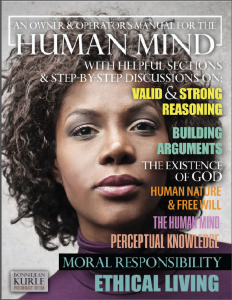An Owner & Operator’s Manual for the Human Mind
A textbook for the 21st Century
Face it.
Philosophy is hard stuff. The most leisured students find it intimidating. But if you add to it a family history in which college skills are not taught, a neighborhood where crime is rampant, and a culture that disparages higher education, youve made this discipline utterly alien.
It doesnt help that academics have long cultivated both an aloof, jargony language and a fierce disdain for the popular culture in which students find identity and comfort.
Its no wonder theres little love between text and readertextbooks reflect this academic worldview. They read as if they were written by one academic to another, barely allowing the student to peek into a sometimes unintelligible, often unsympathetic monologue.
The result is a bored and bewildered reader.


REPLACE IT.
My book is written to the student. Yes, it is rigorous, but it speaks with the language of a friend, and it remains in the culture of the Millennial: that of the student not that of the academic.
The results are astounding.
Students not only find the text accessible, they find themselves readily learningactively doing philosophy and developing critical reasoning and analytical skills that they repeatedly tell meafter they transfer to universitiesthey find missing in many of their more traditionally taught colleagues.
More Info

Feedback
Every quarter, it’s the same thing.
Students ask me if they can get a copy of the book, maintaining access to it even after they complete all coursework.
Every quarter it’s the same thing.
They wonder how a textbook can speak right to them–why other college books aren’t written like this, with the student in mind.
Many former students have returned, asking for favorite chapters to reference, saying they were helpful, challenging, and approachable.
Maybe I shouldn’t be surprised.
Sample Chapters
Inductive Generalizations & Analogical Arguments
The Existence of God & the Problem of Evil
Nature & Nurture (Political Theory)
Book Overview
- Humorous, conversational writing style
- Rigorous treatment of key concerns
- Integrated projects for teams and individuals
- Friendly to flipped classroom structure
- Hybridizing traditional content with magazine article format
- Compliant with fair use doctrine
- Aimed at both skills and knowledge outcomes
- Economically approachable: its free
